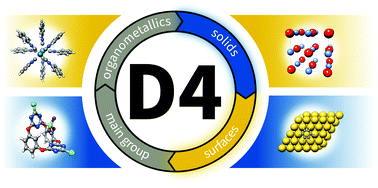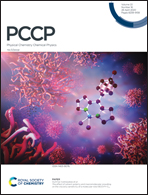Extension and evaluation of the D4 London-dispersion model for periodic systems†
Abstract
We present an extension of the DFT-D4 model [J. Chem. Phys., 2019, 150, 154122] for periodic systems. The main new ingredients are additional reference polarizabilities for highly-coordinated group 1–5 elements derived from pseudo-periodic electrostatically-embedded cluster calculations. To illustrate the performance of the updated method, several test cases are considered, for which we compare D4 to its predecessor D3(BJ), as well as to a comprehensive set of other dispersion-corrected methods. The largest improvements are observed for solid-state polarizabilities of 16 inorganic salts, where the D4 model achieves an unprecedented accuracy, surpassing its predecessor as well as other, computationally much more demanding approaches. For cell volumes and lattice energies of two sets of chemically diverse molecular crystals, the accuracy gain is less pronounced compared to the already excellently performing D3(BJ) method. For the challenging adsorption energies of small organic molecules on metallic as well as on ionic surfaces, DFT-D4 provides values in good agreement with experimental and/or high-level references. These results suggest the application of the proposed D4 model as a physically improved yet computationally efficient dispersion correction for standard DFT calculations as well as low-cost approaches like semi-empirical or even force-field models.

- This article is part of the themed collection: 2020 PCCP HOT Articles


 Please wait while we load your content...
Please wait while we load your content...